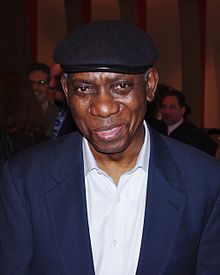Yusef Komunyakaa
Yusef Komunyakaa (born April 29, 1947 in Bogalusa , Louisiana ) is an American writer who currently teaches at New York University . He is a member of the Fellowship of Southern Writers and has received major literary prizes such as the Kingsley Tufts Poetry Award , the Pulitzer Prize for Poetry (both 1994) and the Ruth Lilly Poetry Prize (2001). In his work he deals with topics ranging from the Afro-American attitude to life, the problems of rural life in the southern states before the civil rights movement, to his own experiences as a soldier in the Vietnam War .
Life
The writer
Yusef Komunyakaa was born in 1947 in Bogalusa, Louisiana, during the civil rights movement. He served as a war correspondent in the Vietnam War, where he wrote articles on Vietnamese history and literature, among other things. After his return from Vietnam he turned entirely to poetry and became one of the most important representatives of literary creativity of his generation. Komunyakaa was married to the Australian writer Mandy Sayer for ten years and then had a long-term relationship with the poet Reetika Vazirani , who in 2003 committed suicide with her son Jehan. This in turn was the reason for Sayer to write a book about her own disastrous relationship with Komunyakaa, which also drove her to the verge of suicide ("The Poet's Wife", 2014).
Yusef Komunyakaa studied creative writing at the University of Colorado at Colorado Springs and graduated from the University of California at Irvine in 1980 . After teaching at the University of New Orleans , he was given a chair at Indiana University , which he held for about ten years. Yusef Komunyakaa has been a professor at Princeton University since 1997 . Subsequently (until his retirement in 2006) he worked at New York University ; today he is a senior faculty member in the Creative Writing Program. In 1999 he became Chancellor of the Academy of American Poets for five years . From 2016 to 2019 he was the "New York State Poet Laureate".
The work
Yusef Komunyakaa became famous in 1984 with his collection of poems Copacetic . Using jazz rhythms and syncopation, he created a poetic imagery with the most modern colloquialisms , which was to become characteristic of him. In this work the urge to name cultural truths that are otherwise unspoken in everyday life is to be noted, which should aim at a redeeming effect:
How can love heal
the mouth shut this way ...
Say something did resuscitates
us, behind the masks
(like: "How love can heal
with the mouth closed so ...
Say something we revived
us, behind our masks" )
Also I Apologize for the Eyes in My Head (I apologize for the eyes in my head) was a success; but the breakthrough in the literary scene was Komunyakaa with the publication Dien Cai Dau (pronounced "Dinky Dow", which means "crazy" in Vietnamese), in which he processed his experiences as a soldier in the Vietnam War. The book includes the poem Facing It , in which he describes his feelings at the sight of the Vietnam Veterans' Memorial in Washington, DC . Today the poem is representative of Komunyakaa's entire work:
He's lost his right arm
inside the stone. In the black mirror
a woman's trying to erase names:
No, she's brushing a boy's hair.
(something like: "He lost his right arm
in the stone. In the black mirror
a woman tries
to erase names: No, she is combing a boy's hair.")
Komunyakaa has received several awards for his work. In 1994 he won the Pulitzer Prize for Poetry with his book Neon Vernacular and was one of the finalists of the National Book Critics Circle Award in 1998 with Thieves of Paradise . Furthermore, Komunyakaa was honored with the William Faulkner Prize of the Université de Rennes, the Thomas Forcade Award, the Hanes Poetry Prize and the Bronze Star (for his service in Vietnam). In 1999 he was elected chairman of the Academy of American Poets.
In 2004, Yusef Komunyakaa began working with the dramaturge and theater producer Chad Garcia on a theater adaptation of the Gilgamesh epic . In 2007 he was awarded the Robert Creeley Poetry Award. That same year he gave a reading from his work in the Parker Damon building. In 2009 he was accepted into the American Academy of Arts and Letters . In 2016 he was elected a member of the American Academy of Arts and Sciences .
Works
- Lost in the Bone Wheel Factory (1979)
- Copacetic (1984)
- I Apologize for the Eyes in My Head (1986)
- Dien Cai Dau (1988)
- Magic City (1992)
- Neon Vernacular: New And Selected Poems (1993)
- Thieves of Paradise (1998)
- Talking Dirty to the Gods: Poems (2001)
- Scandalize My Name (2002)
- Pleisure Dome: New And Collected Poems (2004)
- Taboo: The Wishbone Trilogy, Part 1 (2006)
- Gilgamesh: A Verse Play (Wesleyan Poetry) (Idea Chad Gracia), Wesleyan University Press 2006, ISBN 0-8195-6824-4
Web links
- Komunyakaa's biography at The Fellowship of Southern Writers (English)
- Some poems at the Internet Poetry Archive
- Yusef Komunyakaa in the nndb (English)
- Yusef Komunyakaa in the Internet Movie Database (English)
Individual evidence
- ↑ https://as.nyu.edu/english/directory.yusef-komunyakaa.html
- ↑ https://www.nytimes.com/2017/04/24/nyregion/new-york-today-our-state-poet-yusef-komunyakaa.html
- ↑ Academy Members. American Academy of Arts and Letters, accessed January 17, 2019 .
- ^ American Academy of Arts and Sciences : Newly Elected Fellows. In: amacad.org. Retrieved April 22, 2016 .
| personal data | |
|---|---|
| SURNAME | Komunyakaa, Yusef |
| ALTERNATIVE NAMES | Brown, James Willie Jr. |
| BRIEF DESCRIPTION | American writer |
| DATE OF BIRTH | April 29, 1947 |
| PLACE OF BIRTH | Bogalusa , Louisiana |
